
Celebrate Hispanic Heritage Month! This celebration, which runs from September 15 through October 15 each year, celebrates the histories, cultures, and contributions of Americans whose heritage comes from Spain, Mexico, the Caribbean, and Central and South America.
The dates coincide with some significant anniversaries. September 15th is the independence day for Costa Rica, El Salvador, Guatemala, Honduras, and Nicaragua. September 16th is the independence day for Mexico, and Chile's independence day is on the 18th.
A physical book display is now available at the Libraries with the selection rotating weekly. Some of the eBooks listed below also have a physical listing. Please check the availability. Special thanks to our Materials Processing Coordinator Leah Zande in collaboration with the Latine Faculty and Staff Alliance for compiling this list.
Conjured Bodies
Grappo, Laura (2022)
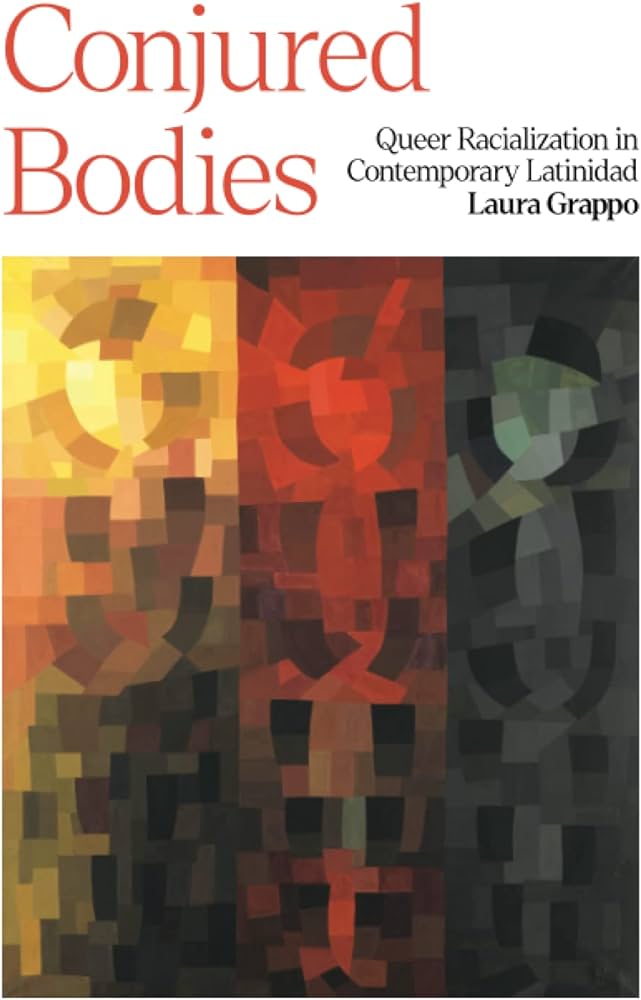 Is Latinidad a racial or an ethnic designation? Both? Neither? The increasing recognition of diversity within Latinx communities and the well-known story of shifting census designations have cast doubt on the idea that Latinidad is a race, akin to white or Black. And the mainstream media constantly cover the “browning” of the United States, as though the racial character of Latinidad were self-evident.
Is Latinidad a racial or an ethnic designation? Both? Neither? The increasing recognition of diversity within Latinx communities and the well-known story of shifting census designations have cast doubt on the idea that Latinidad is a race, akin to white or Black. And the mainstream media constantly cover the “browning” of the United States, as though the racial character of Latinidad were self-evident.
Many scholars have argued that the uncertainty surrounding Latinidad is emancipatory: by queering race—by upsetting assumptions about categories of human difference—Latinidad destabilizes the architecture of oppression. But Laura Grappo is less sanguine. She draws on case studies including the San Antonio Four (Latinas who were wrongfully accused of child sex abuse); the football star Aaron Hernandez’s incarceration and suicide; Lorena Bobbitt, the headline-grabbing Ecuadorian domestic-abuse survivor; and controversies over the racial identities of public Latinx figures to show how media institutions and state authorities deploy the ambiguities of Latinidad in ways that mystify the sources of Latinx political and economic disadvantage. With Latinidad always in a state of flux, it is all too easy for the powerful to conjure whatever phantoms serve their interests. - Publisher's Description
Request this Title
Inhabiting La Patria
Harrison, Rebecca; Hipchen, Emily (2013)
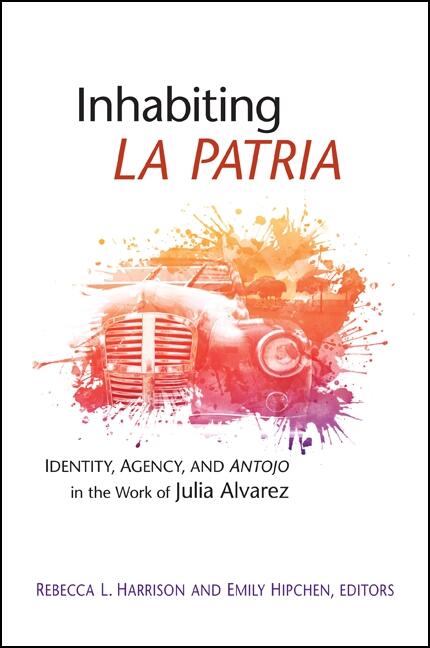 This is the first collection of critical essays on the works of Dominican American author Julia Alvarez. A prolific writer of nearly two dozen books of poetry, fiction, nonfiction, and children's literature, Alvarez has garnered numerous international accolades, including the impressive F. Scott Fitzgerald Award for Outstanding Achievement in American Literature. She was one of only ten poets invited to write for President Obama's inauguration in 2009, and her "In the Time of the Butterflies" was selected as a National Endowment for the Arts Big Read, putting her in the company of Mark Twain, Zora Neale Hurston, and Harper Lee. Yet, despite Alvarez's commercial success and flourishing critical reputation, much of the published scholarship has focused on her two best-known novels "In the Time of the Butterflies" and "How the García Girls Lost Their Accents."
This is the first collection of critical essays on the works of Dominican American author Julia Alvarez. A prolific writer of nearly two dozen books of poetry, fiction, nonfiction, and children's literature, Alvarez has garnered numerous international accolades, including the impressive F. Scott Fitzgerald Award for Outstanding Achievement in American Literature. She was one of only ten poets invited to write for President Obama's inauguration in 2009, and her "In the Time of the Butterflies" was selected as a National Endowment for the Arts Big Read, putting her in the company of Mark Twain, Zora Neale Hurston, and Harper Lee. Yet, despite Alvarez's commercial success and flourishing critical reputation, much of the published scholarship has focused on her two best-known novels "In the Time of the Butterflies" and "How the García Girls Lost Their Accents."
Moving beyond Alvarez's more recognizable work, the contributors here approach her wider canon from different points of access and with diverging critical tools. This enriches current discussions on the construction of selves in life writing, and nonfiction more generally, and furthers our understanding of these selves as particular kinds of participants in the creation of nation and place. In addition, this book provides fresh insight for transnational feminist studies and makes a meaningful contribution to the broader study of the gendered diaspora, as it positions Alvarez scholarship in a global context. - Publisher's Description
Request this Title
Negotiating Latinidades, Understanding Identities within Space
Quinn-Sánchez, Kathryn (2015)
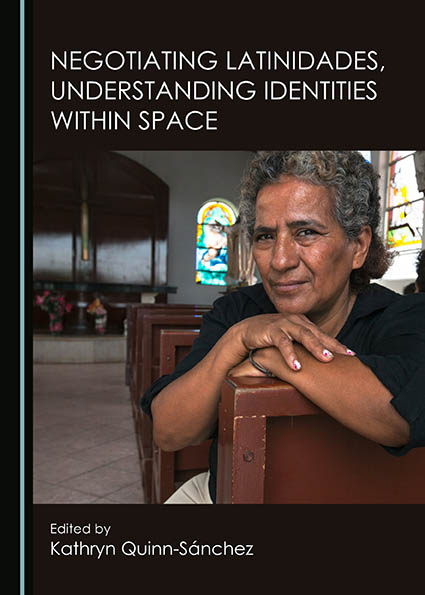 "Negotiating Latinidades, Understanding Identities" within Space remarkably examines how the fluidity of spaces, from literal to abstract, complicates the heterogeneity encompassed in the ways in which individuals identify. This edited collection provides literary analyses of novels, short stories, memoirs, and an autobiography, representative of diverse geographies. Seeking to promote freedom, the text bridges scholarly work among Latina/o studies and Latin American and Caribbean studies, as well as among literature and languages.
"Negotiating Latinidades, Understanding Identities" within Space remarkably examines how the fluidity of spaces, from literal to abstract, complicates the heterogeneity encompassed in the ways in which individuals identify. This edited collection provides literary analyses of novels, short stories, memoirs, and an autobiography, representative of diverse geographies. Seeking to promote freedom, the text bridges scholarly work among Latina/o studies and Latin American and Caribbean studies, as well as among literature and languages.
While timely in many regards, the publication could have made stronger connections to current social, political, cultural, and economic realities. A case in point is the recurring situation in Dominican Republic-Haitian relations, in which a number of Haitian migrants have been forced to flee. It is unfortunate that, because of the timing for this project, these events could not have been included in the historical backdrop of the corresponding chapter. Another example is the ongoing problem of heteropatriarchy. In “Becoming a Bitch Forever,” Lopez’s character is rightfully demonstrated as playing into the patriarchal actions she seeks to disrupt. Yet, this connection with machismo is not noticeably problematized. Lastly, although the essays meet their objectives, the lack of dialogue among them and the absence of a conclusion make the introduction the sole linking thread. - Publisher's Description
Request this Title
Latinas in the United States
Ruíz, Vicki; Sánchez Korrol, Virginia (2006)
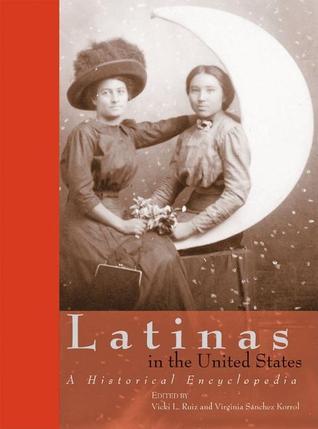 Latinas in the United States: A Historical Encyclopedia records the contribution of women of Latin American birth or heritage to the economic and cultural development of the United States. The encyclopedia, edited by Vicki L. Ruiz and Virginia Sánchez-Korrol, is the first comprehensive gathering of scholarship on Latinas. This encyclopedia will serve as an essential reference for decades to come.
Latinas in the United States: A Historical Encyclopedia records the contribution of women of Latin American birth or heritage to the economic and cultural development of the United States. The encyclopedia, edited by Vicki L. Ruiz and Virginia Sánchez-Korrol, is the first comprehensive gathering of scholarship on Latinas. This encyclopedia will serve as an essential reference for decades to come.
In more than 580 entries, the historical and cultural narratives of Latinas come to life. From mestizo settlement, pioneer life, and diasporic communities, the encyclopedia details the contributions of women as settlers, comadres, and landowners, as organizers and nuns. More than 200 scholars explore the experiences of Latinas during and after EuroAmerican colonization and conquest; the early-19th-century migration of Puerto Ricans and Cubans; 20th-century issues of migration, cultural tradition, labor, gender roles, community organization, and politics; and much more. Individual biographical entries profile women who have left their mark on the historical and cultural landscape.
With more than 300 photographs, Latinas in the United States offers a mosaic of historical experiences, detailing how Latinas have shaped their own lives, cultures, and communities through mutual assistance and collective action, while confronting the pressures of colonialism, racism, discrimination, sexism, and poverty. - Publisher's Description
Request this Title
Solito, Solita
Mayers, Steven; Freedman, Jonathan, (2019)
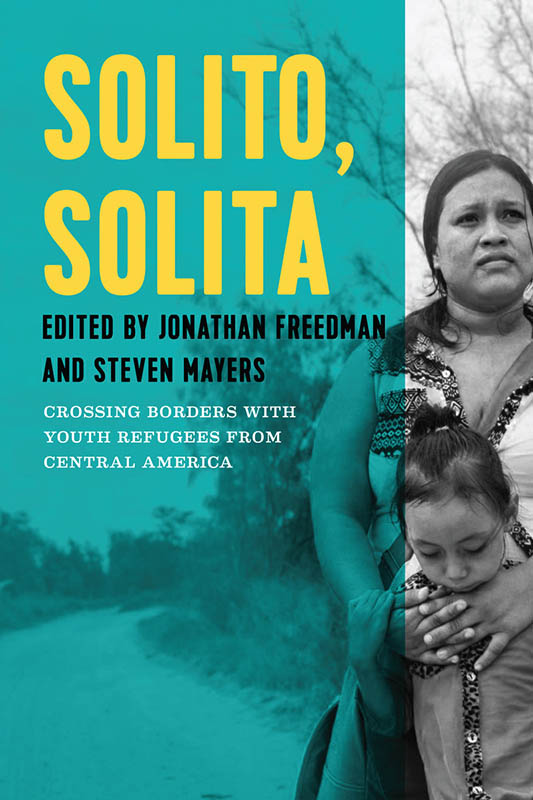 They are a mass migration of thousands, yet each one travels alone.
They are a mass migration of thousands, yet each one travels alone.
"Solito, Solita" (Alone, Alone), shortlisted for the 2019 Juan E. Méndez Book Award for Human Rights in Latin America, is an urgent collection of oral histories that tells—in their own words—the story of young refugees fleeing countries in Central America and traveling for hundreds of miles to seek safety and protection in the United States.
Fifteen narrators describe why they fled their homes, what happened on their dangerous journeys through Mexico, how they crossed the borders, and for some, their ongoing struggles to survive in the United States. In an era of fear, xenophobia, and outright lies, these stories amplify the compelling voices of migrant youth. What can they teach us about abuse and abandonment, bravery and resilience, hypocrisy and hope? They bring us into their hearts and onto streets filled with the lure of freedom and fraught with violence. From fending off kidnappers with knives and being locked in freezing holding cells to tearful reunions with parents, Solito, Solita’s narrators bring to light the experiences of young people struggling for a better life across the border.
This collection includes the story of Adrián, from Guatemala City, whose mother was shot to death before his eyes. He refused to join a gang, rode across Mexico atop cargo trains, crossed the US border as a minor, and was handcuffed and thrown into ICE detention on his eighteenth birthday. We hear the story of Rosa, a Salvadoran mother fighting to save her life as well as her daughter’s after death squads threatened her family. Together they trekked through the jungles on the border between Guatemala and Mexico, where masked men assaulted them. We also meet Gabriel, who after surviving sexual abuse starting at the age of eight fled to the United States, and through study, legal support and work, is now attending UC Berkeley. - Publisher's Description
Request this Title
Don Quixote
Cervantes Saavedra, Miguel de (1605)
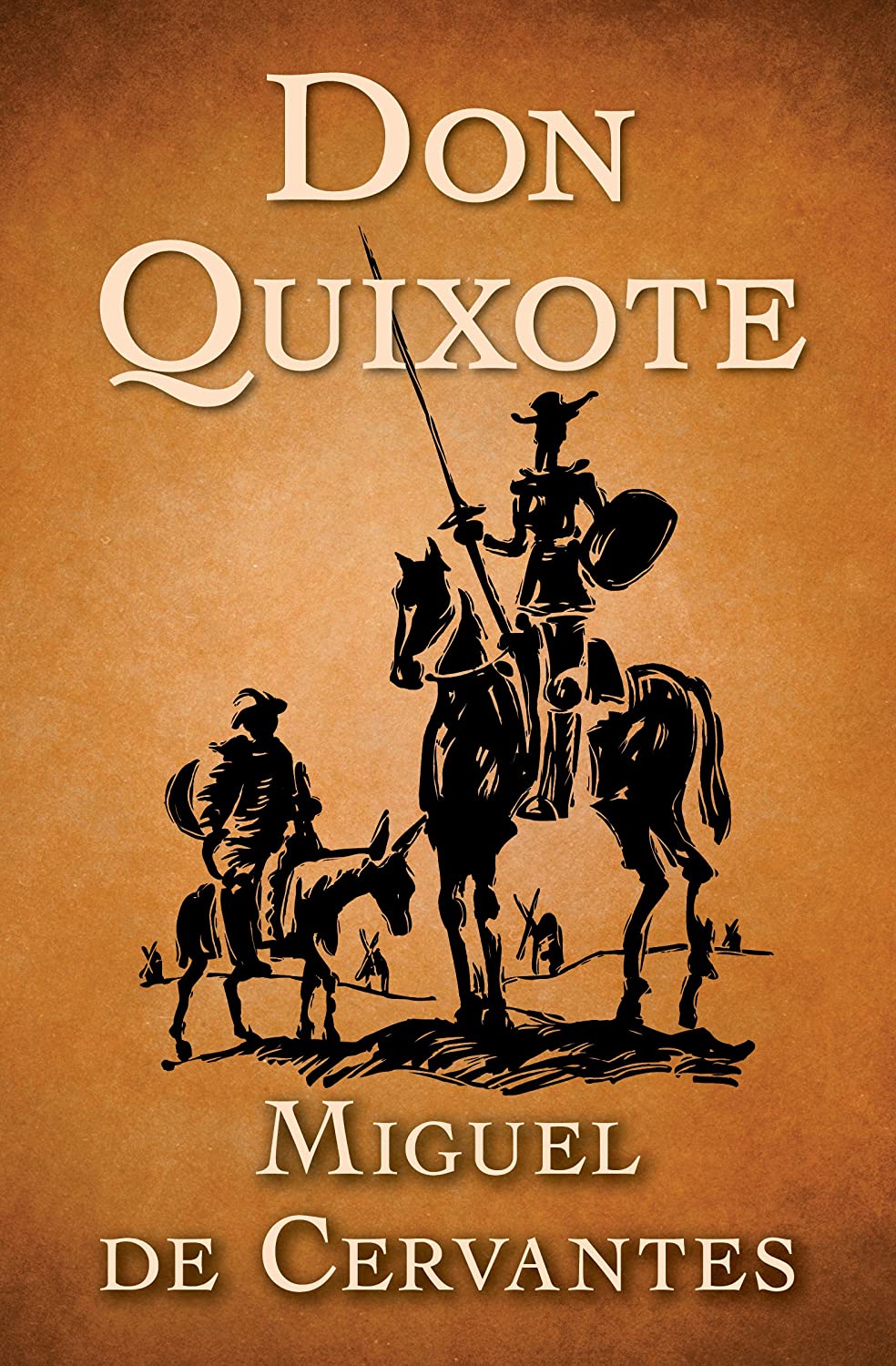 "Don Quixote" has become so entranced reading tales of chivalry that he decides to turn knight errant himself. In the company of his faithful squire, Sancho Panza, these exploits blossom in all sorts of wonderful ways.
"Don Quixote" has become so entranced reading tales of chivalry that he decides to turn knight errant himself. In the company of his faithful squire, Sancho Panza, these exploits blossom in all sorts of wonderful ways.
While Quixote's fancy often leads him astray—he tilts at windmills, imagining them to be giants—Sancho acquires cunning and a certain sagacity. Sane madman and wise fool, they roam the world together-and together they have haunted readers' imaginations for nearly four hundred years.
With its experimental form and literary playfulness, "Don Quixote" has been generally recognized as the first modern novel. - Publisher's Description
Request this Title
Lo Que El Pueblo Me Dice
Colon, Jesus (2019)
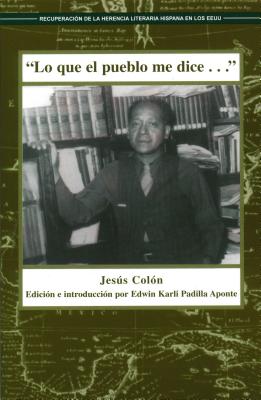 For five decades Jesus Colon, a self-taught intellectual, wrote incisive journalistic commentary from a Hispanic working-class (and later Afro-American) perspective. "Lo Que El Pueblo Me Dice" is the first compilation of his Spanish-language cronicas (journalistic chronicles of everyday life). The three decades of writing reflects the development of the Hispanic community in the city, its primary concerns, hopes and aspirations, as well as its pitfalls and conflicts. - Publisher's Description
For five decades Jesus Colon, a self-taught intellectual, wrote incisive journalistic commentary from a Hispanic working-class (and later Afro-American) perspective. "Lo Que El Pueblo Me Dice" is the first compilation of his Spanish-language cronicas (journalistic chronicles of everyday life). The three decades of writing reflects the development of the Hispanic community in the city, its primary concerns, hopes and aspirations, as well as its pitfalls and conflicts. - Publisher's Description
Request this Title
Healing Memories
Garcia, Elizabeth (2019)
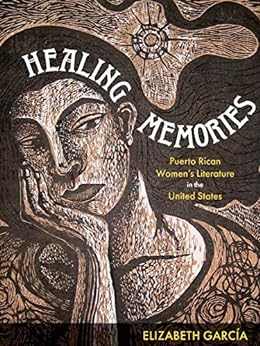 Using an interdisciplinary approach, Healing Memories analyzes the ways that Puerto Rican women authors use their literary works to challenge historical methodologies that have silenced the historical experiences of Puerto Rican women in the United States.
Using an interdisciplinary approach, Healing Memories analyzes the ways that Puerto Rican women authors use their literary works to challenge historical methodologies that have silenced the historical experiences of Puerto Rican women in the United States.
Following Aurora Levins Morales's alternative historical methodology she calls “curandera history,” this work analyzes the literary work of authors, including Aurora Levins Morales, Nicholasa Mohr, Esmeralda Santiago, and Judith Ortiz Cofer, and the ways they create medicinal histories that not only document the experiences of migrant women but also heal the trauma of their erasure from mainstream national history. Each analytical chapter focuses on the various methods used by each author including using the literary space as an archive, reclaiming memory, and (re)writing cultural history, all through a feminist lens that centers the voices and experiences of Puerto Rican women. - Publisher's Description
Request this Title
Open Veins of Latin America
Galeano, Eduardo (1971)
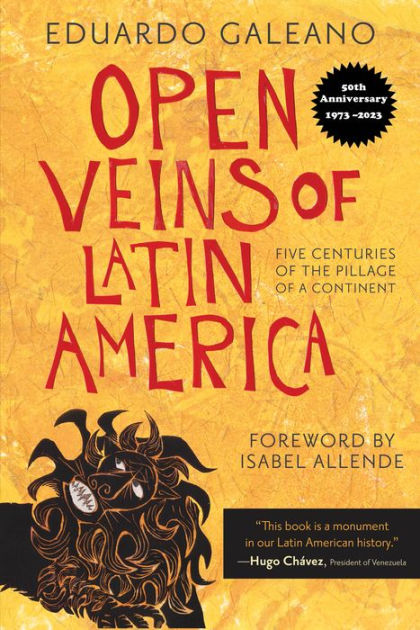 Since its U.S. debut a quarter-century ago, this brilliant text has set a new standard for historical scholarship of Latin America. It is also an outstanding political economy, a social and cultural narrative of the highest quality, and perhaps the finest description of primitive capital accumulation since Marx.
Since its U.S. debut a quarter-century ago, this brilliant text has set a new standard for historical scholarship of Latin America. It is also an outstanding political economy, a social and cultural narrative of the highest quality, and perhaps the finest description of primitive capital accumulation since Marx.
Rather than chronology, geography, or political successions, Eduardo Galeano has organized the various facets of Latin American history according to the patterns of five centuries of exploitation. Thus he is concerned with gold and silver, cacao and cotton, rubber and coffee, fruit, hides and wool, petroleum, iron, nickel, manganese, copper, aluminum ore, nitrates, and tin. These are the veins which he traces through the body of the entire continent, up to the Rio Grande and throughout the Caribbean, and all the way to their open ends where they empty into the coffers of wealth in the United States and Europe.
Weaving fact and imagery into a rich tapestry, Galeano fuses scientific analysis with the passions of a plundered and suffering people. An immense gathering of materials is framed with a vigorous style that never falters in its command of themes. All readers interested in great historical, economic, political, and social writing will find a singular analytical achievement, and an overwhelming narrative that makes history speak, unforgettably. This classic is now further honored by Isabel Allende’s inspiring introduction. Universally recognized as one of the most important writers of our time, Allende once again contributes her talents to literature, to political principles, and to enlightenment. - Publisher's Description
Request this Title
Che's Travels
Drinot, Paulo (2010)
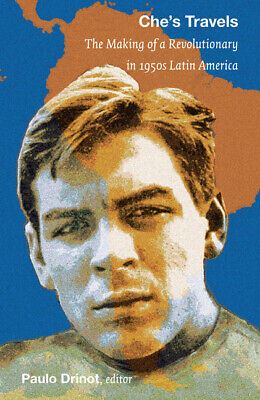 Ernesto “Che” Guevara twice traveled across Latin America in the early 1950s. Based on his accounts of those trips (published in English as The Motorcycle Diaries and Back on the Road), as well as other historical sources, Che’s Travels follows Guevara, country by country, from his native Argentina through Chile, Peru, Colombia, and Venezuela, and then from Argentina through Bolivia, Peru, Guatemala, and Mexico.
Ernesto “Che” Guevara twice traveled across Latin America in the early 1950s. Based on his accounts of those trips (published in English as The Motorcycle Diaries and Back on the Road), as well as other historical sources, Che’s Travels follows Guevara, country by country, from his native Argentina through Chile, Peru, Colombia, and Venezuela, and then from Argentina through Bolivia, Peru, Guatemala, and Mexico.
Each essay is focused on a single country and written by an expert in its history. Taken together, the essays shed new light on Che’s formative years by analyzing the distinctive societies, histories, politics, and cultures he encountered on these two trips, the ways they affected him, and the ways he represented them in his travelogues. In addition to offering new insights into Guevara, the essays provide a fresh perspective on Latin America’s experience of the Cold War and the interplay of nationalism and anti-imperialism in the crucial but relatively understudied 1950s. Assessing Che’s legacies in the countries he visited during the two journeys, the contributors examine how he is remembered or memorialized; how he is invoked for political, cultural, and religious purposes; and how perceptions of him affect ideas about the revolutions and counterrevolutions fought in Latin America from the 1960s through the 1980s. - Publisher's Description
Request this Title
War Against All Puerto Ricans
Denis, Nelson (2015)
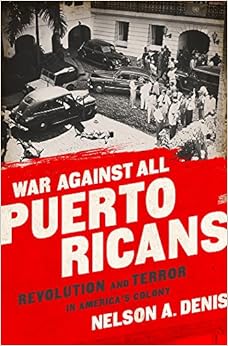 In 1950, after over fifty years of military occupation and colonial rule, the Nationalist Party of Puerto Rico staged an unsuccessful armed insurrection against the United States. Violence swept through the island: assassins were sent to kill President Harry Truman, gunfights roared in eight towns, police stations and post offices were burned down. In order to suppress this uprising, the US Army deployed thousands of troops and bombarded two towns, marking the first time in history that the US government bombed its own citizens.
In 1950, after over fifty years of military occupation and colonial rule, the Nationalist Party of Puerto Rico staged an unsuccessful armed insurrection against the United States. Violence swept through the island: assassins were sent to kill President Harry Truman, gunfights roared in eight towns, police stations and post offices were burned down. In order to suppress this uprising, the US Army deployed thousands of troops and bombarded two towns, marking the first time in history that the US government bombed its own citizens.
Nelson A. Denis tells this powerful story through the controversial life of Pedro Albizu Campos, who served as the president of the Nationalist Party. A lawyer, chemical engineer, and the first Puerto Rican to graduate from Harvard Law School, Albizu Campos was imprisoned for twenty-five years and died under mysterious circumstances. By tracing his life and death, Denis shows how the journey of Albizu Campos is part of a larger story of Puerto Rico and US colonialism.
Through oral histories, personal interviews, eyewitness accounts, congressional testimony, and recently declassified FBI files, "War Against All Puerto Ricans" tells the story of a forgotten revolution and its context in Puerto Rico's history, from the US invasion in 1898 to the modern-day struggle for self-determination. Denis provides an unflinching account of the gunfights, prison riots, political intrigue, FBI and CIA covert activity, and mass hysteria that accompanied this tumultuous period in Puerto Rican history. - Publisher's Description
Request this Title
The Latinos of Asia
Ocampo, Anthony Christian (2016)
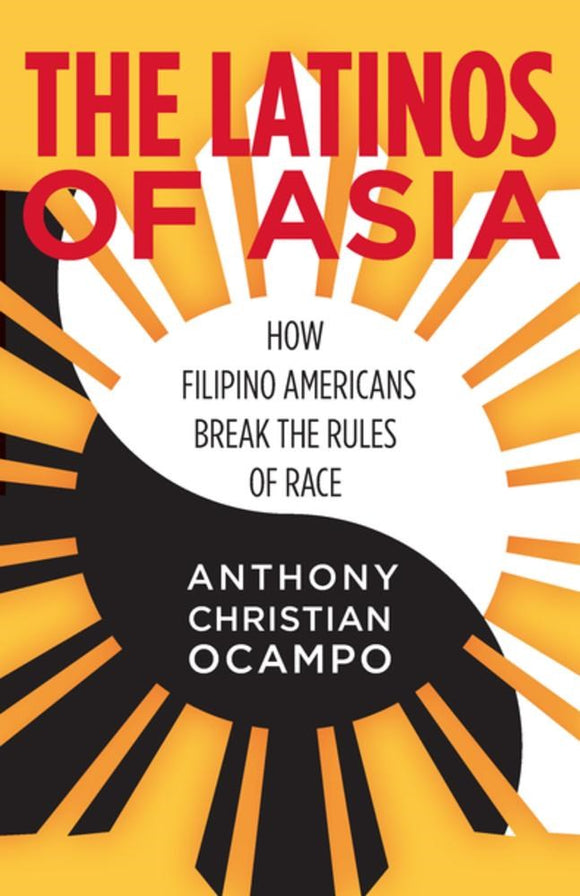 Is race only about the color of your skin? In "The Latinos of Asia," Anthony Christian Ocampo shows that what "color" you are depends largely on your social context. Filipino Americans, for example, helped establish the Asian American movement and are classified by the U.S. Census as Asian. But the legacy of Spanish colonialism in the Philippines means that they share many cultural characteristics with Latinos, such as last names, religion, and language. Thus, Filipinos' "color"―their sense of connection with other racial groups―changes depending on their social context.
Is race only about the color of your skin? In "The Latinos of Asia," Anthony Christian Ocampo shows that what "color" you are depends largely on your social context. Filipino Americans, for example, helped establish the Asian American movement and are classified by the U.S. Census as Asian. But the legacy of Spanish colonialism in the Philippines means that they share many cultural characteristics with Latinos, such as last names, religion, and language. Thus, Filipinos' "color"―their sense of connection with other racial groups―changes depending on their social context.
The Filipino story demonstrates how immigration is changing the way people negotiate race, particularly in cities like Los Angeles where Latinos and Asians now constitute a collective majority. Amplifying their voices, Ocampo illustrates how second-generation Filipino Americans' racial identities change depending on the communities they grow up in, the schools they attend, and the people they befriend. Ultimately, "The Latinos of Asia" offers a window into both the racial consciousness of everyday people and the changing racial landscape of American society. - Publisher's Description
Request this Title
Oy, Caramba
Stavans, Ilan (2016)
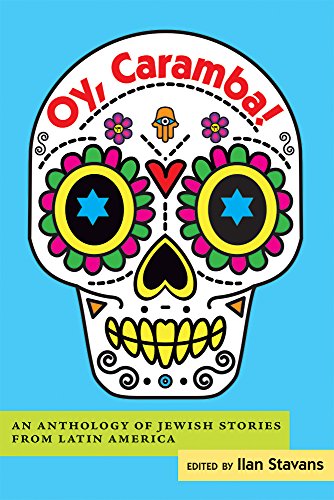 "Writers from Argentina, Brazil, Peru, Venezuela, Guatemala, Mexico, and other countries represent an ethnically diverse culture with roots in eastern Europe as well as Spain... The anthology includes tales by such masters as Alberto Gerchunoff,... a large number of innovative women writers, and some authors more familiar to English-speaking readers." - Library Journal
"Writers from Argentina, Brazil, Peru, Venezuela, Guatemala, Mexico, and other countries represent an ethnically diverse culture with roots in eastern Europe as well as Spain... The anthology includes tales by such masters as Alberto Gerchunoff,... a large number of innovative women writers, and some authors more familiar to English-speaking readers." - Library Journal
"Reminds us that society south of the border is just as multicultural as in the US, and that Jews have played an important role in it since the time of the Spanish conquest." - Publishers Weekly
Jewish identity and magical realism are the themes of the tales of adventure and cultural alienation collected here by the leading authority on Jewish Latin American literature. First published in 1994 as Tropical Synagogues: Short Stories by Jewish-Latin American Writers, Ilan Stavans's classic anthology is expanded and updated in this new edition. - Publisher's Description
Request this Title
The Land of Open Graves
De Leon, Jason; Wells, Michael (2016)
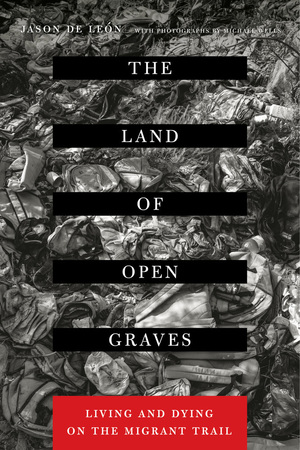 "The Land of Open Graves" reveals the suffering and deaths that occur daily in the Sonoran Desert of Arizona as thousands of undocumented migrants attempt to cross the border from Mexico into the United States.
"The Land of Open Graves" reveals the suffering and deaths that occur daily in the Sonoran Desert of Arizona as thousands of undocumented migrants attempt to cross the border from Mexico into the United States.
Drawing on the four major fields of anthropology, De León uses an innovative combination of ethnography, archaeology, linguistics, and forensic science to produce a scathing critique of “Prevention through Deterrence,” the federal border enforcement policy that encourages migrants to cross in areas characterized by extreme environmental conditions and high risk of death. For two decades, systematic violence has failed to deter border crossers while successfully turning the rugged terrain of southern Arizona into a killing field. Featuring stark photography by Michael Wells, this book examines the weaponization of natural terrain as a border wall: first-person stories from survivors underscore this fundamental threat to human rights, and the very lives, of non-citizens as they are subjected to the most insidious and intangible form of American policing as institutional violence.
In harrowing detail, De León chronicles the journeys of people who have made dozens of attempts to cross the border and uncovers the stories of the objects and bodies left behind in the desert. - Publisher's Description
Request this Title
The Cry of the Senses
Ellis Neyra, Ren (2020)
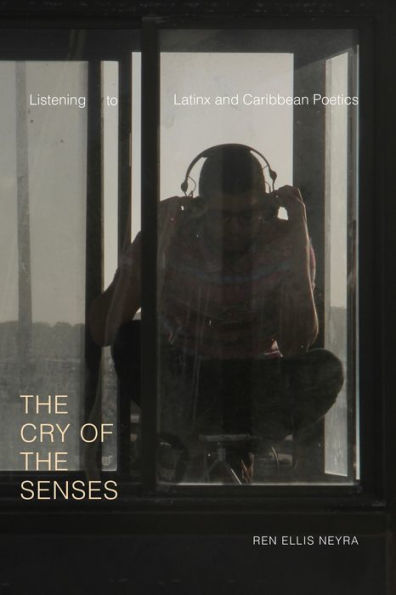 In "The Cry of the Senses," Ren Ellis Neyra examines the imaginative possibility for sound and poetics to foster new modes of sensorial solidarity in the Caribbean Americas. Weaving together the black radical tradition with Caribbean and Latinx performance, cinema, music, and literature, Ellis Neyra highlights the ways Latinx and Caribbean sonic practices challenge antiblack, colonial, post-Enlightenment, and humanist epistemologies. They locate and address the sonic in its myriad manifestations—across genres and forms, in a legal trial, and in the art and writing of Xandra Ibarra, the Fania All-Stars, Beatriz Santiago Muñoz, Édouard Glissant, and Eduardo Corral—while demonstrating how it operates as a raucous form of diasporic dissent and connectivity.
In "The Cry of the Senses," Ren Ellis Neyra examines the imaginative possibility for sound and poetics to foster new modes of sensorial solidarity in the Caribbean Americas. Weaving together the black radical tradition with Caribbean and Latinx performance, cinema, music, and literature, Ellis Neyra highlights the ways Latinx and Caribbean sonic practices challenge antiblack, colonial, post-Enlightenment, and humanist epistemologies. They locate and address the sonic in its myriad manifestations—across genres and forms, in a legal trial, and in the art and writing of Xandra Ibarra, the Fania All-Stars, Beatriz Santiago Muñoz, Édouard Glissant, and Eduardo Corral—while demonstrating how it operates as a raucous form of diasporic dissent and connectivity.
Throughout, Ellis Neyra emphasizes Caribbean and Latinx sensorial practices while attuning readers to the many forms of blackness and queerness. Tracking the sonic through their method of multisensorial, poetic listening, Ellis Neyra shows how attending to the senses can inspire alternate, ethical ways of collective listening and being. - Publisher's Description
Request this Title
Listening to Salsa
Aparicio, Frances (2010)
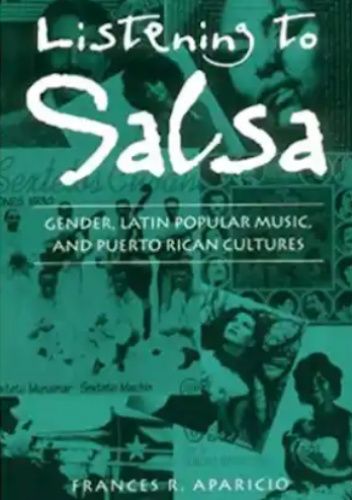 For Anglos, the pulsing beats of salsa, merengue, and bolero are a compelling expression of Latino/a culture, but few outsiders comprehend the music's implications in larger social terms. Frances R. Aparicio places this music in context by combining the approaches of musicology and sociology with literary, cultural, Latino, and women's studies. She offers a detailed genealogy of Afro-Caribbean music in Puerto Rico, comparing it to selected Puerto Rican literary texts, then looks both at how Latinos/as in the US have used salsa to reaffirm their cultural identities and how Anglos have eroticized and depoliticized it in their adaptations.
For Anglos, the pulsing beats of salsa, merengue, and bolero are a compelling expression of Latino/a culture, but few outsiders comprehend the music's implications in larger social terms. Frances R. Aparicio places this music in context by combining the approaches of musicology and sociology with literary, cultural, Latino, and women's studies. She offers a detailed genealogy of Afro-Caribbean music in Puerto Rico, comparing it to selected Puerto Rican literary texts, then looks both at how Latinos/as in the US have used salsa to reaffirm their cultural identities and how Anglos have eroticized and depoliticized it in their adaptations.
Aparicio's detailed examination of lyrics shows how these songs articulate issues of gender, desire, and conflict, and her interviews with Latinas/os reveal how they listen to salsa and the meanings they find in it. What results is a comprehensive view "that deploys both musical and literary texts as equally significant cultural voices in exploring larger questions about the power of discourse, gender relations, intercultural desire, race, ethnicity, and class." - Publisher's Description
Request this Title
LatinX Voices
Coronado, Katie (2018)
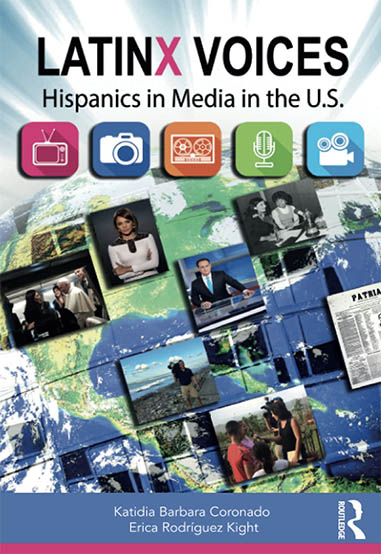 "LatinX Voices" is the first undergraduate textbook that includes an overview of Hispanic/LatinX Media in the U.S. and gives readers an understanding of how media in the United States has transformed around this audience. Based on the authors’ professional and research experience, and teaching broadcast media courses in the classroom, this text covers the evolving industry and offers perspective on topics related to Latin-American areas of interest.
"LatinX Voices" is the first undergraduate textbook that includes an overview of Hispanic/LatinX Media in the U.S. and gives readers an understanding of how media in the United States has transformed around this audience. Based on the authors’ professional and research experience, and teaching broadcast media courses in the classroom, this text covers the evolving industry and offers perspective on topics related to Latin-American areas of interest.
With professional testimonials from those who have left their mark in print, radio, television, film and new media, this collection of chapters brings together expert voices in Hispanic/LatinX media from across the U.S., and explains the impact of this population on the media industry today. - Publisher's Description
Request this Title
Otherness in Hispanic Culture
Fernández Ulloa, Teresa (2014)
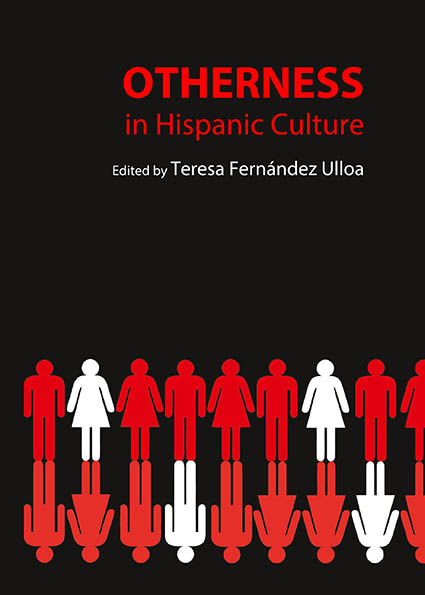 This book addresses contemporary discourses on a wide variety of topics related to the ideological and epistemological changes of the 19th, 20th and 21st centuries and the ways in which they have shaped the Spanish language, literature, and film in both Spain and Latin America. The majority of the chapters are concerned with 'otherness' in its various dimensions; the alien Other-foreign, immigrant, ethnically different, disempowered, female or minor-as well as the Other of different sexual orientations and ideologies. Following Octavio Paz, otherness is expressed as the attempt to find the lost object of desire, the frustrating endeavour of the androgynous Plato wishing to embrace the other half of Zeus, who in his wrath, tore off from him.
This book addresses contemporary discourses on a wide variety of topics related to the ideological and epistemological changes of the 19th, 20th and 21st centuries and the ways in which they have shaped the Spanish language, literature, and film in both Spain and Latin America. The majority of the chapters are concerned with 'otherness' in its various dimensions; the alien Other-foreign, immigrant, ethnically different, disempowered, female or minor-as well as the Other of different sexual orientations and ideologies. Following Octavio Paz, otherness is expressed as the attempt to find the lost object of desire, the frustrating endeavour of the androgynous Plato wishing to embrace the other half of Zeus, who in his wrath, tore off from him.
"Otherness" compels human beings to search for the complement from which they were severed. Thus a male joins a female, his other half, the only half that not only fills him but which allows him to return to the unity and reconciliation which is restored in its own perfection, formerly altered by divine will. As a result of this transformation, one can annul the distance that keeps us away from that which, not being our own, turns into a source of anguish. The clashing diversity of all things requires the human predisposition to accept that which is different. Such a predisposition is an expression of epistemological, ethical and political aperture. The disposition to co-exist with the different is imagined in the de-anthropocentricization of the bonds with all living realms. And otherness is, in some way, the reflection of sameness (mismidad). The other is closely related to the self, because the vision of the other implies a reflection about the self; it implies, consciously or not, a relationship with the self. These topics are addressed in this book from an interdisciplinary perspective, encompassing arts, humanities and social sciences. - Publisher's Description
Request this Title
Feature image by Ardian Lumi on Unsplash
